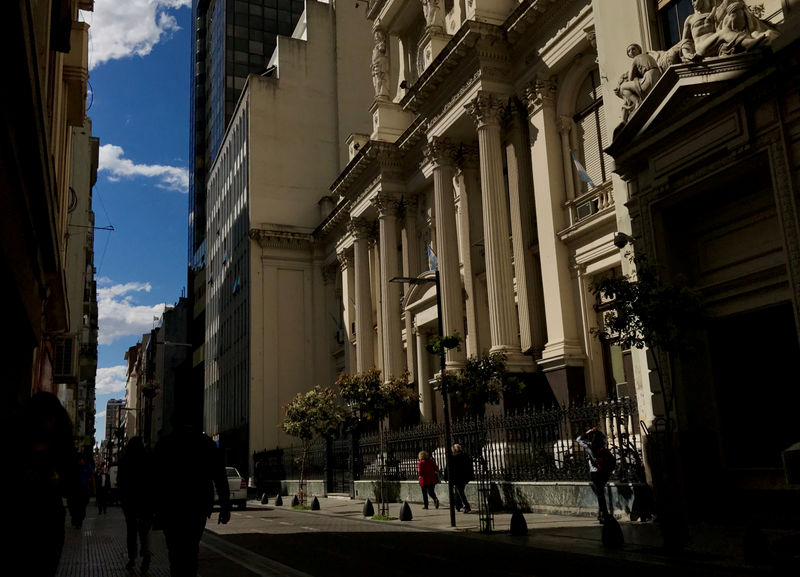By Cassandra Garrison and Gabriel Burin
BUENOS AIRES (Reuters) - Argentina's central bank bought $190 million in foreign exchange markets over the past week to weaken its peso currency, a radical change from just months ago when it was spending billions to prop it up, and may be forced to intervene further.
After a run on the peso last year halved its value, the central bank introduced a super-tight monetary policy that boosted the currency. But over the past week the strengthening currency has slipped outside the limits of a non-intervention band agreed with the International Monetary Fund.
In part, the improvement in the peso's fortunes has been due to dwindling expectations that the Federal Reserves will raise U.S. interest rates. Rising U.S. Treasury yields last year drained money from emerging markets, hurting the peso.
In addition, the tighter monetary policy introduced last year to stabilize the peso has left many small- and medium-sized Argentine companies without access to pesos. President Mauricio Macri's government froze growth in the money supply last year as part of the $56.3 billion IMF agreement.
As a result, many companies in Argentina have been forced to sell dollars in recent weeks to make payments in local currency to pay suppliers, salaries and taxes.
The combination of domestic and international factors pushed the peso to strengthen past the limit of its band for the first time on Jan. 10, prompting the central bank to intervene for five days in a row over the past week.
On Thursday, the bank remained on the sidelines of the market after several days of intervention as the peso fell 0.56 percent to 37.7 per U.S. dollar, pushing it back inside the band. The moving band stood at 37.523 pesos to the dollar to 48.559 on Thursday.
Yet some economists suggested the bank may be forced to resume its dollar buying in the coming days.
"Purchases of dollars could continue as pressures on the exchange rate increase because companies and families have to sell dollars to get pesos," said Martin Vauthier, director of consultancy Eco Go.
While the slump in the peso last year sowed economic chaos, the strengthening in the currency isn't necessarily a good thing, economists say. The weaker peso helped to make Argentina's products more competitive overseas, raising hopes that a rebound in exports could fuel growth after a painful recession.
"Argentina needs a weaker peso. Further peso appreciation could halt the external adjustment that Argentina needs to rebalance and narrow its current account deficit," said Edward Glossop, who covers emerging markets at Capital Economics in London.
MAINTAINING THE BAND
For Carlos de Sousa, a senior economist at Oxford Economics, Argentina's sky-high interest rates need to fall to prevent the peso from strengthening above the upper limit of its band in the medium-term, as the central bank has pledged not to buy more than $50 million a day to stabilize it.
"The central bank of Argentina has made too many promises. You are promising that you are not going to allow the monetary base to grow and that you are not going to intervene more than $50 million a day, and not more than 2 percent of your monetary base per month. That is a really big set of promises," De Sousa said.
However, with elections looming in October, in which business-friendly President Mauricio Macri faces a tough battle to win a second term, the peso could also come under selling pressure as political uncertainty mounts, economists said.
If the peso strays outside the band for weeks on end, it would raise questions over whether the bank should drop the policy, said Ilya Gofshteyn of Standard Chartered (LON:STAN) in New York.
"It's almost a self-fulfilling prophecy. The more speculation heats up, the more capital inflows you get, and therefore the more pressure on the bank there is to let the band go all together," Gofshteyn said.
Other economists took a cautious view that the band will remain in place, but could flatten as the peso stabilizes.
"Over time, you hope it becomes a freely floating exchange rate, but there is a case for waiting until after the election before you make the next step," said Dirk Willer, an emerging market analyst at Citigroup (NYSE:C).
